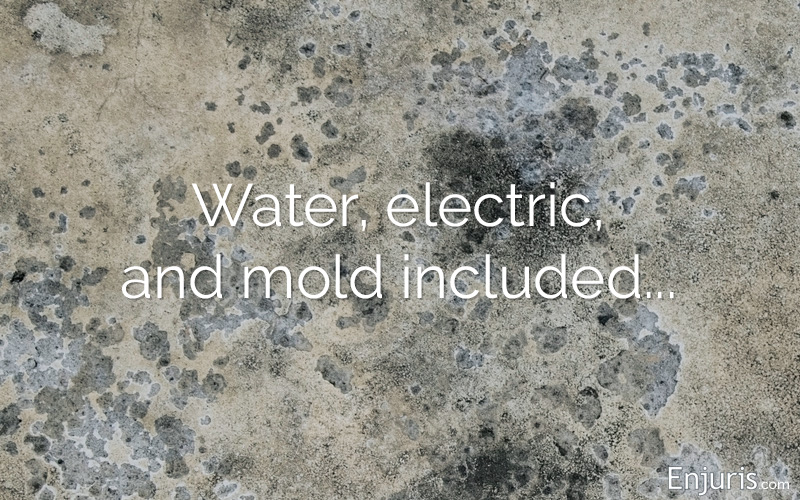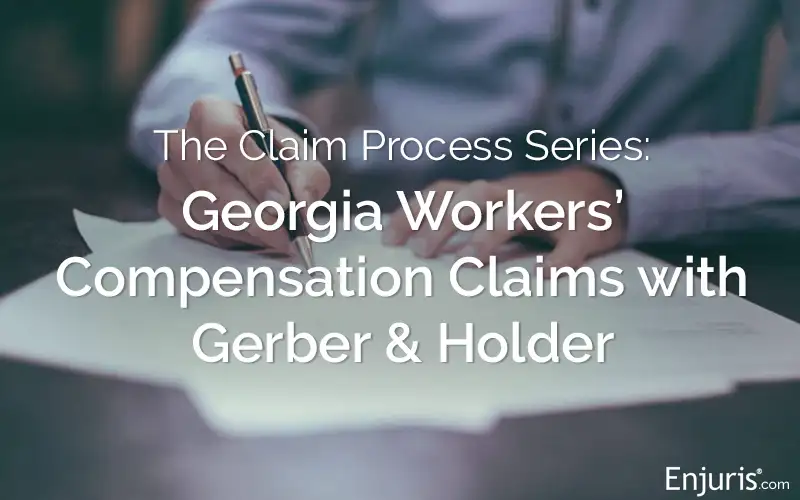
You bend down to pick up the toothbrush you dropped on your bathroom floor and that’s when you see it — black mold covering the bottom of your sink.
You’re renting the apartment and your first instinct is to pack your suitcase and run out the door. But, you have two children and no place to go.
Step outside and take a deep breath. In Georgia, you have options when black mold appears in your rental.
What is mold?
Mold is a fungus that can appear on all sorts of surfaces, including:
- Paper products
- Wood products
- Ceiling tiles
- Wallpaper
- Dust
- Drywall
- Carpet
- Upholstery
Molds thrive in moist conditions and reproduce by producing tiny spores that travel through the air.
Though people often think of mold as being black or green, mold can be gray, yellow, orange, or some combination of colors. Generally speaking, mold has a velvety, wooly, or fuzzy texture.
Can black mold be harmful?
It’s important to remember that not all black molds are toxic and not all toxic molds are black.
Let’s look first at non-toxic black mold.
Non-toxic black mold
Several types of black mold aren’t toxic at all. The most common type is Cladosporium, which is most frequently found on living and dead plants, both inside and outside. Other non-toxic molds that may appear black include Ulocladium, Stemphylium, Pithomyces, Alternaria, Dresclera, and Aureobasidium.
Non-toxic black molds generally don’t harm healthy people. However, people who have allergies or asthma and inhale excessive quantities of mold particles inside may experience:
- Skin rashes
- Runny noses
- Eye irritation
- Coughing
- Nasal congestion
- Aggravation of asthma
- Difficulty breathing
People with immune suppression or lung disease may be at increased risk for infections from non-toxic black molds.
Now let’s look at toxic black molds.
Toxic black mold
Some molds produce toxins called mycotoxins. The 2 black molds that contain mycotoxins are:
- Stachybotrys chartarum
- Aspergillus niger
These 2 black molds are commonly found in moisture-damaged buildings (usually on materials with high cellulose content, like drywall, wood, paper, and ceiling tiles). People who are exposed to high levels of mycotoxins can suffer:
- Fatigue
- Nausea
- Headaches
- Irritation of the lungs and eyes
- Asthma and other respiratory issues
Though these health consequences may not seem too severe, it’s important to keep in mind that public health departments admit the full health effects of toxic molds aren’t fully known.
Is your landlord required to take action if you discover toxic mold in your rental?
Landlords in Georgia have a statutory duty to maintain the rental unit in good repair. This means that the landlord must keep the premises in “that state of repair which is reasonably necessary to make it fit for the use intended by the [tenant].” If the landlord fails to make repairs within a reasonable time after due notice, the landlord is liable for damages resulting from the failure to make such repairs.
So, does the presence of toxic black mold render an apartment unfit for its intended use?
The law in Georgia isn’t clear, but case law suggests that the presence of black mold may make an apartment unfit. Consequently, a landlord in Georgia most likely has to remove black toxic mold from your apartment.
What should you do if you discover black mold?
Your landlord isn’t obligated to remove the black mold if they don’t know about it. Because of this, the first thing you need to do after discovering the mold is to provide your landlord with a written letter informing them of the issue.
If your landlord fails to remove the toxic mold, you have the right to pay a professional to remove the mold and subtract the cost from your rent. This is known as “repair and deduct.” If you choose to go this route, keep in mind that the removal costs must be “reasonable.” Be sure to keep all of your receipts.
As most tenants know, interactions with landlords don’t always go smoothly. Your landlord might argue that they don’t have to clean up the mold because you caused it, or they might argue that the mold isn’t toxic or that the cleanup costs you subtracted from your rent were too high.
If you’re having problems with your landlord, you might have to file a personal injury lawsuit or take your landlord to small claims court.
Use our free online directory to locate an experienced landlord-tenant attorney in your area.


dotty says
yes but i’m in florida. do you recommend florida attorney for Volusia County?
pipe broke in wall, i reported i water by washing machine end of may 2020. found pipe broke opened wall to fix it , living area bedroom and connected bath. commercial de humidifier 8 days going on. they will not answers about mold. i have been to er by 911, and due to covid virus impossible for me to re locate. very comprised immune system
Melissa Gold says
Hi, Dotty. I’m so sorry you’re dealing with this. I know the COVID-19 virus has really impacted people’s ability to get help when they need it, too. You can find a Florida attorney here: https://www.enjuris.com/directory/lawyers/florida/. Best of luck, and I hope you feel better soon.
Asauntwa Craft says
I live in ga and have been complaint about numerous water leaks in my apartment that has resulted in black mold maintenance sprayed bleach claiming it was a mixture to clean the mold but the mold has come back I’ve spent 5 months dealing with water leaking that they have lied on work orders claiming they have repaired but I have pictures proving nothing has been repaired, Manager said I could move out but will loose my deposit for breaking my lease smh I need help please
Tanesha Roberts says
I contacted my landlord. All they did is came and sprayed some white spray and left. I have a skin rash, my eyes in the morning are crusty. I want to know what can be done. The mold has stared frowning on my wall, baseboards, appliances and my furniture. They stated they were going to bring me a humidifier but they did not. My townhouse that I am renting is still very moist and smells.
Caren Hart says
My daughter is in a rental near her university in Kennesaw, Ga. Her home test purchased at the hardware store was full of black mold within 24 hours. Do you know any reputable removal companies as well as a list of lawyers in my area?
Ian Pisarcik says
Thank you for your question. You can use our free online directory to locate an attorney near you. Your attorney will be able to help you find a mold-removal company. Additionally, the Georgia Department of Public Health has some helpful resources.
Tennia says
I live in Swainsboro housing apartment and all the apartment have mold in them you can see where they painted on top of the mold. I have asthma and something in my bedroom makes me cough at night. Tennia
Ian Pisarcik says
I’m sorry you are dealing with this.
Your landlord has a duty to provide reasonably safe housing. If there is toxic mold in your apartment, your landlord is legally obligated to have it removed. I would recommend writing your landlord a letter explaining the issue and asking him to remove the mold in a reasonable amount of time. Be sure to send the letter “certified mail with return receipt requested” so you have proof that the landlord received the letter.
Sandhya kodimala says
Hi,
I am tenant of Georgia, in 2019 when we moved into a apartment after couple of months noticed a black mold growing on windows. Informed management about it and they just told us it is black mildew and keep cleaning with Clorox. We have been doing it since than and while we are moving out they are now saying we failed to inform about mold and charging us. Can we file a case? I have asthma and now that I recall I had issues with breathing often in this house.
Mildred says
I live in Lawrenceville Ga., I moved into a brand new apartment building, that has only been up less than a year. I discovered black mold only last month, July 2021, that came from water that was coming under the foundation when it rains. The landlord was notified of the situation as soon as I became aware. I suffer with asthma and allergies which has been worst. I have pain in my chest, my nose I awake during the night and can’t breathe. I have been back and forth to doctors and was given breathing treatments, which I have everyday,, and inhalers. They came and did a quick fix to the apartment without cleaning or removing the mold, nor did they move to a place. I really do need some advice as to how to pursue this that I am faced with.
Amy Turner says
Hi. I’ve been in a rent to own home (through a private owner ) for over 2 years now. What are my options for black mold due to a leaky roof? I just found a past tenant that knows the house had the leak when her family lived here. I have asthma and am disabled and can’t climb on the roof nor can afford to hire a roofer.
Elsie says
Landlord is aware of ongoing mold and other adverse housing issues in a HUD income-based senior housing 4-story building … affecting the health of all in building … what now …
Concerned mother says
My daughter and roommates are in a rental in Kennesaw, Georgia. They can see mold in the air vents and on one of the bedroom walls. They are sending someone to clean vents and stated if that company saw mold anywhere else that they will contact them immediately. Maintenance cam e in to do a repair on a kitchen drawer, one person was home and up stairs and miraculously they checked the room with mold on the walls and it had been painted over. I have pictures of the molded wall and now where there is fresh paint. Concerned about where this mold is growing…. My daughter has been sick for over 2 months with upper respiratory problems, headaches and we could not figure out why. I think they should b removed from the property until he problem is fixed. Is cleaning the vents a solution to the problem? What about whats causing the mold in the first place.
Keirea says
I have been living in this rent a room house for over a year on April 13 2021 I expressed to my landlord which I have on recording that I think there’s mold due to the fact that my room keeps flooding from the horrible plumbing. He basically threatened me by saying “if you think there’s an mold you can leave and if you don’t okay we don’t need to worry about it” and now it is November 1 and the mold has only spread and he still hasn’t fixed it. So I want to move out but I wanna know can I sue him before I move out because the mold is literally everywhere and then he’s still moving in new tenants and not telling them about this dangerous issue
Elsie says
Yes, but more than mold is making a HUD senior housing apartment building unsafe for human habitation in GA … Elsie